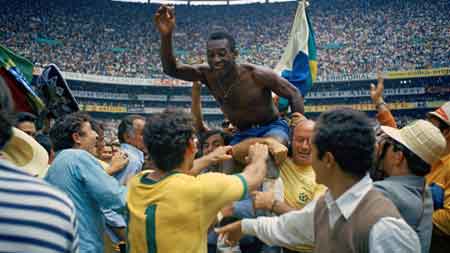
Pele, Ronaldinho, Garrincha -- the names of past Brazilian superstars -- roll off the tongue like a verse of great romance poetry. These monikers are not always formal names but instead are often nicknames adopted for soccer.
據(jù)《洛杉磯時(shí)報(bào)》報(bào)道,貝利、羅納爾迪尼奧、加林查,這些曾經(jīng)的巴西足壇巨星的名字,讓人讀起來(lái)朗朗上口,押韻地如同羅馬詩(shī)句。這些名字其實(shí)不是他們的本名,而是他們?yōu)榱俗闱蛉〉摹八嚸薄?/p>
Pele, widely considered the best soccer player ever, is actually named Edson Arantes do Nascimento, after the American inventor Thomas Edison.
Pele said he got his nickname as a kid when he mispronounced the name of Brazilian goalkeeper Bilé as Pilé. A playmate used the mistake to taunt him, and when he moved to the city of Bauru, the “Pilé!” chants evolved to Pele, the name he used to represent Brazil in four World Cups. “Thanks to that goalie Bilé, and a classmate’s little joke, I became Pele,” he wrote. “Now it’s known across the world.”
貝利被認(rèn)為是有史以來(lái)最偉大的足球運(yùn)動(dòng)員,他的本名其實(shí)是埃德森·阿蘭蒂斯·多·納西門托(Edson Arantes do Nascimento),源自于美國(guó)發(fā)明家托馬斯·愛迪生(Thomas Edison)。貝利曾說他之所以叫貝利,是因?yàn)槠浜⑼瘯r(shí)期誤把巴西隊(duì)守門員Bilé叫成 Pilé。朋友用貝利的口誤來(lái)開他玩笑,當(dāng)他到了巴魯(巴西東南部的一城市), Pilé就變成了 Pele(貝利),而他用這個(gè)名字代表巴西隊(duì)出戰(zhàn)了四屆世界杯。“感謝守門員Bilé,也感謝我朋友的小玩笑,我成為了貝利,”他寫道,“現(xiàn)在全世界都知道了貝利這個(gè)名字。”
Hulk, the star forward on the current Brazilian World Cup team, got his nickname because he was obsessed with the comic book character as a child. But physical attributes are often used to peg nicknames and if you take one look at Givanildo Vieira de Souza’s muscular build it’s easy to see why “Hulk” stuck.
浩克(Hulk),本屆杯賽巴西陣中一員,司職前鋒。他之所以叫浩克,是因?yàn)樗麖男“V迷于漫畫人物綠巨人浩克。但是身形體格也是一個(gè)原因,當(dāng)你看到吉萬(wàn)尼爾多·維埃拉·德·索薩(浩克的本名)結(jié)實(shí)的肌肉之后,浩克這個(gè)名字也就說的通了。
Dunga, captain of Brazil’s 1994 World Cup title team, got his nickname from the Brazilian name for Dopey, from Disney’s “Snow White and the Seven Dwarfs” film – because of his short stature as a kid.
鄧加(Dunga),以隊(duì)長(zhǎng)身份率領(lǐng)巴西奪得1994年世界杯冠軍。而Dunga在葡萄牙語(yǔ)中意為Dopey,Dopey是迪士尼動(dòng)畫片白雪公主與七個(gè)小矮人中的迷糊鬼,鄧加小時(shí)候很瘦小,因而有了這個(gè)綽號(hào)。
Garrincha (for “l(fā)ittle bird”), who played for Brazil in three World Cups from 1958 to 1966, was given his nickname because he flew right through defenders with his dribbles.
加林查(葡萄牙語(yǔ)中意為小鳥),從1958年至1966年代表巴西隊(duì)參戰(zhàn)三屆世界杯,他在球場(chǎng)上盤帶過人,輕盈地如同小鳥,所以有了這個(gè)綽號(hào)。
A boy named Artur became Arturzico (little Artur), which was then abbreviated again to Zico, the famous Brazilian player of the '70s and '80s.
Arturzico縮減成zico,就是七八十年代著名的巴西球星濟(jì)科的名字。
Sometimes the diminutive is not a choice. Ronaldinho used his nickname to avoid being confused with his slightly older teammate Ronaldo – they both were on Brazil’s 2002 World Cup winning team.
但有些時(shí)候,縮減名字也行不通,小羅就用他的昵稱 Ronaldinho 以區(qū)別另一稍比他年長(zhǎng)的巴西球星羅納爾多,他們于2002年一起代表巴西隊(duì)出戰(zhàn)韓日世界杯。
(譯者 小愛Tiana 編輯 齊磊)
